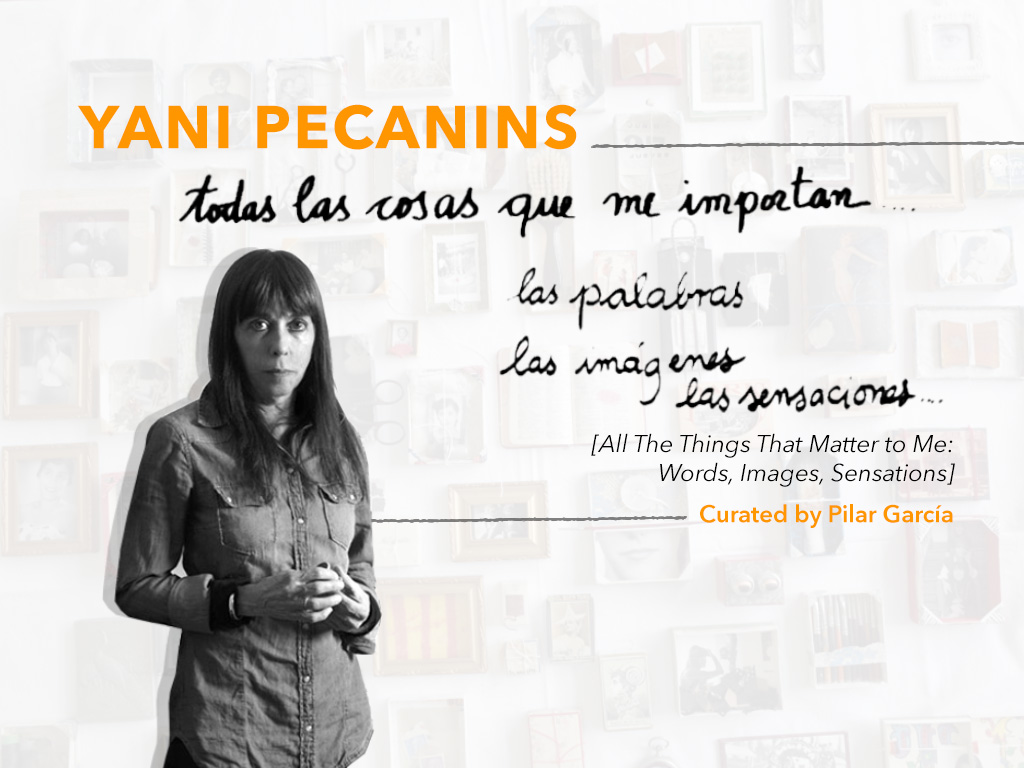
Yani Pecanins.
“All The Things That Matter to Me: Words, Images, Sensations”
Yani Pecanins (1957-2019) is a central figure in the artist’s book movement in Mexico, through her work in promoting this medium, as an editor, and in her artistic practice. This exhibition celebrates her trajectory and considers these three aspects of her work, from the beginning of her career through her final creations. Her production transgresses the boundaries of what art history has traditionally classified as object art, artist’s books and installations, and her book-objects expand the notion of the artist’s book, establishing a constant intersection between objecthood, the visual and the poetic.
Yani Pecanins studied linotype and bookbinding in Barcelona, and with this foundation began her professional involvement withpthe art of the book in 1977, when with her brother Walter Doehner and Gabriel Macotela she founded the Project Cocina Ediciones, conceived as an alternative, independent space dedicated to the publication, design, printing and production of artist’s books, limited-edition magazines and artist’s portfolios, all produced by hand and at a low cost. Installed in the kitchen of her home, Cocina Ediciones focused on collective and experimental work that stimulated continuous collaborations between artists, writers, and poets, and introduced innovations in the use of materials and printing processes, employing mimeograph, photocopies and rubber stamps on austere paper surfaces.







Interview with Yani Pecanins by Magali Lara for the exhibition Circuito abierto: dos experiencias editoriales en el Fondo de Felipe Ehrenberg (Open Circuit: Two Publishing Experiences in the Felipe Ehrenberg Archive), 2012
Excerpt: Cocina Ediciones and magazines.
Image: Luis Felipe Ortega
Production: Museo Universitario Arte Contemporáneo (DiGAV-UNAM)
Courtesy Arkheia Documentation Center, MUAC, (DiGAV-UNAM)


In her search to promote new configurations in the circuits of creation and distribution of art, Yani also founded El Archivero, together with Gabriel Macotela and Armando Sáenz Carrillo, in 1993. Following the example of bookstores in New York and the then defunct Cocina ediciones, El Archivero was dedicated to the exhibition, promotion, and distribution of artist’s books, and constituted a key platform for alternative publications. It functioned as a bookstore, gallery, and collection through 1993, and stood out as a fundamental venue for artist’s books and a meeting place for various groups and individuals involved in the production of artist’s books, mail art and limited editions in Mexico, fostering a dialogue in relation to the production of books on a national and international level. In the various locations it occupied at different times, on the streets of Frontera, Tabasco, and Alvaro Obregon in Mexico City, El Archivero organized various thematic exhibitions and facilitated the production of a wide variety of publications, that continue to represent a network of exchanges and an essential aspect of Mexico’s opening to new aesthetic discourses in the 1970’s to 1990’s.









Interview with Yani Pecanins by Magali Lara for the exhibition Circuito abierto: dos experiencias editoriales en el Fondo de Felipe Ehrenberg, 2012
Excerpt: El Archivero
Image: Luis Felipe Ortega
Production: Museo Universitario Arte Contemporáneo (DiGAV-UNAM)
Courtesy Arkheia Documentation Center, MUAC, (DiGAV-UNAM)



Interview with Yani Pecanins by Magali Lara for the exhibition Circuito abierto: dos experiencias editoriales en el Fondo de Felipe Ehrenberg, (Open Circuit: Two Publishing Experiences in the Felipe Ehrenberg Archive), 2012
Excerpt: Viaje en Zeppelin
Image: Luis Felipe Ortega
Production: Museo Universitario Arte Contemporáneo (DiGAV-UNAM)
Courtesy Arkheia Documentation Center, MUAC, (DiGAV-UNAM)
As an artist, from the late 1970’s on Yani Pecanins collected objects, photographs, and documents that she employed in her singular production of book-boxes and later book-objects, manufactured from the standpoint of her private, intimate world. In these works, she intertwines her position with respect to gender roles—in particular she refers to female domestic labor—and in relation to family obsessions, principally the residual memories of a complex lineage marked by exile, and by references to dispossession, absence, seclusion, and identity. The child of immigrant parents—German and Catalan—Yani was born in Mexico City and raised in an environment focused on art; her mother and aunts were the owners of an important art gallery founded in the 1960’s. Her close relationship with Alan Glass, a friend of her family circle, and with Kati Horna, determined her inclination toward objects with a dense history, that Yani imbued with an intense emotional charge. In her production, Yani interlaces various narratives, using objects and an “office aesthetic” characterized by rubber stamps, labels, and stickers; these elements are incorporated into the collages that she constructed with photographs, fabric remnants, found objects and documents printed with the same techniques that she used in her publishing work, that are literally basted, mended, pasted and held together by pins. Through her calligraphy, she created her own artistic language in which words and phrases add both poetic and visual significance to everyday objects—plates, cups, and dresses—on which she inscribed both her own words and appropriated quotations.







Interview with Yani Pecanins by Magali Lara for the exhibition Circuito abierto: dos experiencias editoriales en el Fondo de Felipe Ehrenberg (Open Circuit: Two Publishing Experiences in the Felipe Ehrenberg Archive), 2012
Excerpt: Artist’s books
Image: Luis Felipe Ortega
Production: Museo Universitario Arte Contemporáneo (DiGAV-UNAM)
Courtesy Arkheia Documentation Center, MUAC, (DiGAV-UNAM)

















































 Huellas-Guantes (Imprints-Gloves), 2013. Calligraphy on gloves."/>
Huellas-Guantes (Imprints-Gloves), 2013. Calligraphy on gloves."/> 

















ACKNOWLEDGEMENTS
Arkheia Documentation Center, Museo Universitario Arte Contemporáneo (DiGAV-UNAM)
Karen Cordero, Andrea De Caso, Dylan Doehner Pecanins, Mariana Hernández Cruz, Magali Lara, Luis Felipe Ortega, Leticia Torres, Dylan Von Gunten.